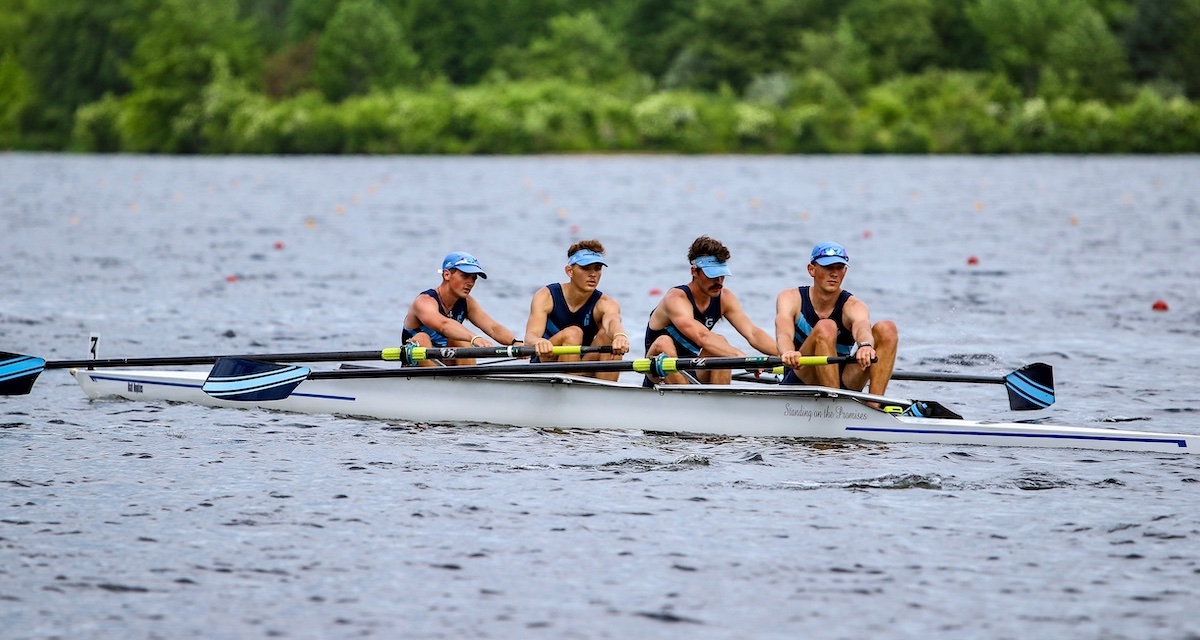Get Your Feet Wet: Three Tips for Novice Rowers
Last weekend Gordon student-athletes launched their boats into Mercer Lake (NJ) alongside the likes of Princeton and Stanford, their oars gracing past the freshly affixed “Standing on the Promises” boat decal under the stroke seat in their sprint to their third place finish in the Intercollegiate Rowing Association (IRA) national championship. Half of them had never rowed before joining the Gordon team and moving into an elite spot in the nation’s DI lightweight rowing championship. Four men and two ladies represented the Scots on Mercer Lake over Memorial Day weekend, and they are just the beginning step in Gordon’s pursuit of rowing excellence.
It’s National Learn to Row Day, and according to Head Coach Maddie Hopkins ’18, “that’s what we’re about. College rowing is all about people picking up the sport pretty late and then being able to jump right in.”
For some, the sport wasn’t available where they grew up. For others, the sport they played growing up wasn’t available at the collegiate level. Rowing offers common ground. “If you’re a kid who likes to be on the water and you like to work hard, what we do is really compelling,” explains Hopkins.
And she’ll try to convince you it’s simple: “Put the oar in the water and move the boat as fast as you can. Once they learn how to do the put-the-oar-in-the-water part, it’s just a matter of getting stronger and faster. The first week, you go from zero to 90 miles per hour, and the next four years, you’re working on that last 10.”
For mastering that learning curve, Hopkins shares three tips for anyone learning to row:
- Fail first. “This is not applicable to life,” cautions Hopkins, “but if [the boat] starts to get tippy, I teach everyone to fall out. Don’t wait for the boat to flip over because it’s really hard to flip the boat back over.”
- Keep the handles together. In sculling, which is two oars per person, “Your left hand goes on top of your right hand,” explains Hopkins, “and as long as the handles are close to the same height, the boat won’t flip. When you let one hand get really high and one hand get really low, you run the risk of the boat tipping over.”
- Relax. “Tight shoulders, a death grip on the oars and a tense core will work against you in a big way,” says Hopkins. Ironically, the tighter you grip the oars, the tippier your boat gets. Instead, she recommends, “Hold on loosely and relax your neck and shoulders and everything else will come together!”
This summer, Hopkins and her team will be sharing that advice a lot as they train rowers from local high schools and other colleges through the Gordon Rowing Association, the North Shore’s most competitive club rowing program.
And in the fall, she’ll repeat it to the 24 incoming students joining her team—none of whom have touched an oar before. But, she adds, rowing caters to the later learners. “Their first year, they’re technically called ‘frosh novice’ and they race other people who are just learning how to row at the collegiate level.”
To give her “frosh novices” a leg up, Hopkin’s strategy is to have them dive right in—literally. “During pre-season, which happens during Orientation,” she explains, “we put all the novices in singles and we send them off the dock. They fall out, and get back in. Fall out, and get back in. And by the end of the week, they know how to row.”
Having access to singles (boats for one person), thanks to the generosity of Gordon donors who have invested in the rowing program, and being on a lake (Chebacco Lake, just a couple miles from campus), is the “ticket for getting people to be confident, quickly,” she says. That and the dedication of a coach who herself has been a lifelong rower and entrepreneur. Hopkins started the rowing team as a student in 2015 and quickly grew it into a full-fledged program, garnering national championship titles (including the recent Dad Vail), fundraising support and community involvement.
“Rowing is one of the few sports that boasts competitors from middle schoolers to octogenarians,” she says. ”The main reason for that is because once you lock into a boathouse community, you’re hard pressed to live without one. It’s home, it’s family, it’s accountability, and at the end of the day, it’s tired bodies and full hearts.”
 The Bell
The Bell